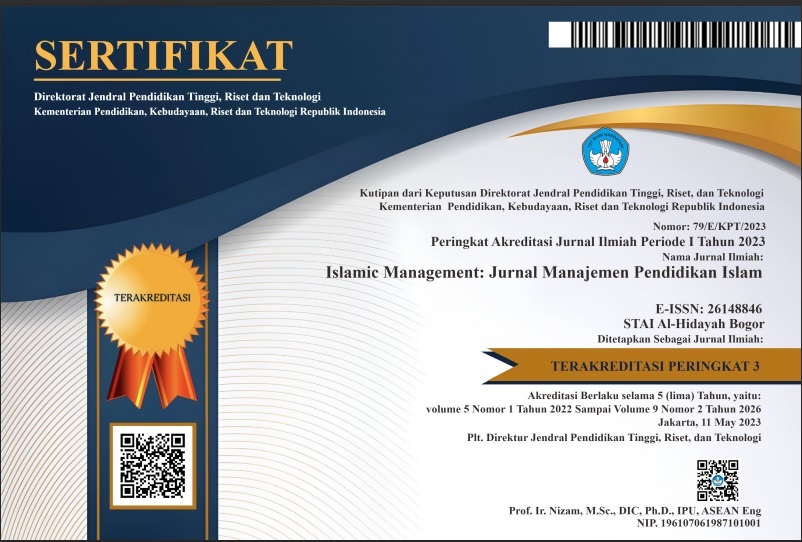CASHLESS MANAGEMENT IN ISLAMIC BOARDING SCHOOLS TO ENHANCE STUDENT’S FINANCIAL DISCIPLINE
(A CASE STUDY AT PONDOK PESANTREN IBNU HAFIZ SUBANG)
DOI:
https://doi.org/10.30868/im.v8i02.8445Keywords:
Cashless Management, POAC, Financial Discipline, Students, Islamic Boarding SchoolsAbstract
The problems that often occur at the Ibnu Hafiz Islamic Boarding School, Subang, are related to the use of cash among students, such as losing money, wasting money, and difficulty controlling daily expenses. In response to these conditions, the Islamic boarding school implemented a cashless system based on electronic cards connected to each student's account. This study examines the cashless system's management (POAC) in improving students' financial discipline at the Ibnu Hafiz Islamic Boarding School, Subang. This study uses a qualitative approach with a case study method. Data were obtained through in-depth interviews, observations, and documentation, which were analyzed using the POAC (Planning, Organizing, Actuating, Controlling) framework. The results of the study indicate that the cashless system was planned based on real needs in the field to discipline and educate students financially. In terms of organization, the Islamic boarding school formed a special team, collaborated with banks, and conducted socialization for all elements of the Islamic boarding school. The implementation of the system was carried out in stages and systematically, accompanied by mentoring and education for students. Evaluations were carried out periodically by internal and external teams (banks and student guardians) to ensure the system's effectiveness. Implementing the cashless system has been proven to reduce violations related to money, increase discipline, and shape the character of students who are more orderly, economical, and financially responsible. In conclusion, cashless management in Islamic boarding schools has not only succeeded in overcoming technical financial problems. However, it is also effective in fostering students' character through healthy financial habits.
References
Aini, Q., & Rokhman, F. (2021). Digital Payment Systems in Islamic Boarding Schools: Efficiency and Transparency. Journal of Islamic Economics, 12(2).
Arner, D. W., Barberis, J., & Buckley, R. P. (2016). The Evolution of Fintech: A New Post-Crisis Paradigm? Georgetown Journal of International Law, 47(4), 1271–1319.
Bandura, A. (1991).Social Cognitive Theory of Self-Regulation. Organizational Behavior and Human Decision Processes.
Birch, D. (2014). Identity is the new money. London Publishing Partnership.
Creswell, J. W. (2016). Research Design: Pendekatan Kualitatif, Kuantitatif, dan Campuran (Edisi ke-4). Yogyakarta: Pustaka Pelajar.
Economic Education Review. (2022). Early Financial Discipline and Its Impact on Personal Finance Management. EER Journal, 41(3), 112–123.
Humaira, N., et al. (2022).Cashless Payment Systems in Islamic Education: Benefits and Challenges. Journal of Islamic Finance.
Mardiasmo. (2018). Akuntansi Sektor Publik. Yogyakarta: Andi.
Miles, M. B., Huberman, A. M., & Saldaña, J. (2014). Qualitative Data Analysis: A Methods Sourcebook (3rd ed.). Thousand Oaks: SAGE Publications.
Moleong, L. J. (2019). Metodologi Penelitian Kualitatif. Bandung: Remaja Rosdakarya.
Munandar, M. (2021). Digitalisasi Pendidikan dan Literasi Keuangan Siswa melalui Sistem Pembayaran Nontunai. Jurnal Pendidikan Ekonomi, 14(2), 101–110.
Ningsih, L. (2022). Manajemen Keuangan Digital di Lembaga Pendidikan Islam. Jurnal Manajemen Pendidikan Islam, 10(1), 45–53.
Nurhayati, S. (2022). Financial Behavior of Santri: A Case Study in East Java. Pesantren Studies Press.
Otoritas Jasa Keuangan. (2021). Literasi dan Inklusi Keuangan di Kalangan Pelajar. Jakarta: OJK Press.
Prasetyo, A., & Sari, D. (2022). Digitalisasi Keuangan dan Disiplin Finansial Pelajar di Era Industri 4.0. Jurnal Manajemen Pendidikan Islam, 8(1), 22–34.
Saputra, A., & Lestari, D. (2021). Implementasi Sistem Pembayaran Digital di Sekolah Menengah: Studi Efisiensi dan Akuntabilitas. Jurnal Teknologi Pendidikan, 9(3), 88–97.
Terry, G. R. (1958). Principles of Management. Homewood, IL: Richard D. Irwin.
Wahyudi, A., dkk. (2023). Cashless Society and Financial Discipline in Islamic Education. International Journal of Zakat.
Wicaksono, T. (2020). Cashless Society: Transformasi Sistem Keuangan di Era Digital. Jurnal Ekonomi dan Bisnis, 25(1), 35–42.
Yuniarti, S. (2021). Pengaruh Sistem Pembayaran Digital terhadap Perilaku Finansial Mahasiswa. Jurnal Ekonomi dan Keuangan, 12(2), 45–56.
Yuniarti, S., & Pratama, R. (2022). Tantangan Implementasi Sistem Keuangan Digital di Sekolah. Jurnal Administrasi Pendidikan, 13(2), 67–74.
Downloads
Published
How to Cite
Issue
Section
Citation Check
License
Copyright (c) 2025 R. Muhammad Misbahudin, Helmawati Helmawati

This work is licensed under a Creative Commons Attribution-ShareAlike 4.0 International License.
Authors who publish with this journal agree to the following terms:
- Authors retain copyright and grant the journal right of first publication with the work simultaneously licensed under a Creative Commons Attribution License that allows others to share the work with an acknowledgment of the work's authorship and initial publication in this journal.
- Authors are able to enter into separate, additional contractual arrangements for the non-exclusive distribution of the journal's published version of the work (e.g., post it to an institutional repository or publish it in a book), with an acknowledgment of its initial publication in this journal.
- Authors are permitted and encouraged to post their work online (e.g., in institutional repositories or on their website) prior to and during the submission process, as it can lead to productive exchanges, as well as earlier and greater citation of published work (See The Effect of Open Access).






